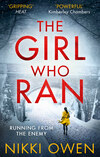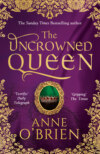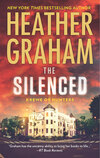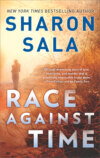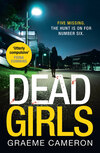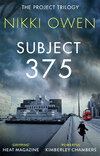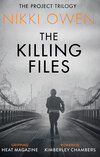Kitabı oku: «The Girl Who Ran (The Project Trilogy)», sayfa 3
‘Doc,’ Patricia says, ‘he’s right. They’ll follow you and then MI5’ll want you dead and the Project will want you with them, just like before. The Home Secretary asked to meet you. Wouldn’t that be the right idea? She’s based in Westminster – it doesn’t get much safer than there. The Project and MI5 can’t get you then.’
‘Hang on though,’ Chris says. ‘What if she knows something – your mom, Isabella?’
I turn to him. ‘What do you mean?’
‘Okay, so, what if we find her and she can, I don’t know, tell us something to really put the nail in the Project’s coffin? Because the way I see it, you can’t trust—’
Patricia shakes her head. ‘No. No way. Too risky…’
‘A nail in a coffin?’ I say, but Patricia continues.
‘The police have our bloody pictures, Chris, for God’s sake. They’ll find us. And then MI5 will get to us before we get back to the UK and we’re all stuffed.’
‘Wimp,’ he says. ‘We’ll be fine.’
Patricia rolls her eyes and looks to me. ‘Doc, I don’t like it. It’s risky. God, I’d rather we went to the safe house of Chris’s in Zurich than go to the hospital in Geneva.’
There is a wall straight in front of us. It is beige, bland, the grouting along the brickwork in neat patterned lines, each one with a clear beginning and an obvious ending. I calculate the length of the edges to help my brain to think straight in the midst of the plane engine roar in the air around me, the birds in the swaying fir trees near the network of road and railways, the tremble of trolley wheels and the faint scent of distant cigarette smoke. Yet it is only when a lick of aviator fuel flicks my nostrils, jolting me upwards, that the thought occurs to me.
The brick and the grouting and the definable end. I think about that word – end – how it sounds and what it means…
Slowly at first then faster, I study the cellar picture in my hands then scan the dates scrawled on the back. ‘There is an end.’
Patricia looks over. ‘What d’you mean?’
I spin round to Chris, my mind moving at speed. ‘Isabella’s birth date and death date are both on this photograph.’
He looks.
‘If she is alive,’ I continue, brain planning now at lightning speed, ‘as the email said, why is the date of her death written here? It was written over two decades ago. The conclusion can only be that either my Papa wrote down the date without it being true or—’
‘Or the Home Secretary is lying,’ Chris says.
I look to him, his body stomping from foot to foot, his breath blowing small, white candy strands into the air, and for the first time since we arrived in Zurich, I feel a strong urge to turn to him and nuzzle my face in his neck and just smell him.
‘I have to know whether she is alive or not,’ I say now. ‘And if Weisshorn Hospital was her last known location then that is where we will go.’
Patricia stretches bolt upright. ‘Doc, no. I don’t think that’s a good idea. There’s a high chance she’s not there and then what? Why on earth d’you want to go there, Doc, when it’s so risky? Why?’
I stare at Isabella’s image. ‘She is the only family I have left,’ I say, quietly, softly.
Patricia’s shoulders drop. ‘Oh, Doc.’ Around us, lace patterns of snow float to the tarmac and evaporate into nothing. Patricia wipes her eyes, but doesn’t speak and when I inspect her left hand, I see her index finger and thumb pressing hard against each other so the skin is white.
‘Ok, so Google,’ Chris says. ‘You freak out on trains, right?’
I tear my sight from Patricia. ‘What?’
Chris leans against the wall and, fast, flips open his laptop. ‘There’s the Goldenpass route to Lausanne in Geneva. It’s long, but quiet, a tourist route, but not busy at this time of year. We can lie low.’ He looks to me, hair flopping in his eyes. ‘Would you be okay with that? It would mean it’s calmer for you to, well, to deal with.’
I study the details he has pulled up on the journey. Wide-open carriages, large windows, space, clean mountain air and no crowds. ‘We will have to change outfits so we are not recognised.’
‘No sweat. I’ve got untraceable credit cards that can buy us new stuff, and an uncanny ability to deactivate security cameras.’ He pauses, drops still for a moment, looks to the photograph in my hand. ‘Hey, we’ll find her, whatever the ending. We can go under the radar, figure out everything we can. We’ve done it before, we can do it again.’
I watch his lips move, smell his scent. ‘Can you hack into the Weisshorn Hospital, track any data?’
His face breaks out into a grin. ‘For you? Anything.’
Patricia coughs. ‘What’— she stops, swallows— ‘sorry – what time does the train depart?’
‘In one hour,’ Chris says. ‘We all ready to go?’
‘Yes.’ I throw my rucksack to my shoulder. ‘But first, I need to use the toilet facilities.’
‘Oh. Okay,’ Patricia says. She slips her cell phone from her bag, checks it and slides it out of sight.
Chapter 6
Goldenpass railway line, The Alps, Switzerland.
Time remaining to Project re-initiation: 26 hours and 20 minutes
I am unable to pull my eyes from the palette of watercolour before me. Aching blue lagoons of sky sifting in a mist of citrus and orange peel. Carpets of green grass shoots sprinkled with sugar flakes of snow all scattered among petals of spring painted with brush strokes of yellows and lilacs and multi-coloured confetti. Majestic mountains rise up, backs straight, muscles taut, mountains that, each time I gaze at them, each second I take in their strong, solid presence as they whisk past the window, a lump forms in my throat. When my sight drifts up to the fading turquoise of the sky, my breathing softens, and I think to myself that no matter what happens, no matter what wars are raged, what lives are slain, what untruths are spewed and sewn, the mountains that soar high above us are always there. Solid, present and true.
‘Doc, you okay?’
I peel my forehead from the window. Patricia now wears a wine-red sweat top with a hood and pocket, and on her legs blue jeans the colour of the night sea hug her skin. Her brown wig is still in place, as is Chris’s bottle-blonde mane as he sits by us hunched over his laptop. We are all now casually dressed, but, despite the simple comfort of the clothes, the fresh cardboard cotton of the t-shirt I currently wear itches my skin, irritating me. It’s unbearable, so I go to take it off, but Patricia reaches forward.
‘No, Doc. Not here.’
I stop. ‘Why?’
‘People don’t get changed down to their bras in public places.’
I drop my hand. ‘Oh.’
Scratching my stomach to bat away the clothing annoyance, I glance round the carriage. It is sparse. An old man with white hair wearing a pressed herringbone coat, black tie, cotton-blue shirt sits two seats beyond reading a daily newspaper containing headlines about the NSA and their surveillance of the German Head of State. Near to him is perched a young woman, small bird-like shoulders hunched over a worn-out copy of Animal Farm, the dog ears of the cover touching the tips of ten porcelain fingers as she turns the page, nails bitten, faded black jeans on petite, slim legs.
The only other group in the carriage is a father in his early thirties with two children, both boys under the age of ten, one nestled under each arm. The children are swaddled in navy blue duffle coats sewn with eight toggles apiece and they sit across a wooden table, opposite an elderly woman whose stomach and chin rest in kneaded batches of dough, square metal-framed glasses perched on the tip of a podgy nose as, making conversation with the small family, she points out the various Alpine sights that trundle past.
I observe the father for a moment, watch the way he smiles each time one of his sons whoops or claps at spotting a random cow or a snow-covered mountain top. A father, living, breathing. I hold my gaze on the family scene then, swallowing hard, I touch the picture of my Papa and the photograph of Isabella and her baby.
‘Hey,’ Patricia says, leaning forwards a little, ‘what’ve you done to your thumb?’
‘What?’
‘Your thumb – have you hurt yourself?’
I glance down at the small wound peeking out beneath a pale plaster still partially wet with blood. ‘I cut it.’
‘Where?’
‘In the toilets in Zurich.’
She leans forward. ‘Ooof, that looks sore. Must have been some wallop you gave it.’
I hide my hand out of sight and try to ignore the sting. ‘It is healing.’
The train jostles on and I take out my notebook, careful to avoid contact with my thumb. I check our current location against the brief list I have compiled to help me tackle the journey. Places, times, exact locations, short, sketched scenarios.
Satisfied we are on schedule, I peer through the wide window again and breathe easier. I turn my attention to Chris and his laptop.
‘Have you hacked the Weisshorn database yet?’
He shakes his head. ‘Yeah, but it doesn’t make sense.’
‘What does not make sense?’
Chris sits back, scratches his chin. ‘Well, okay, so I’m in their system, yeah – the hospital’s. I still can’t find Isabella’s name, but, either way, there seems to be some kind of glitch with my computer.’ He swivels his laptop to me and points. ‘See it?’
There are a series of numbers, stretching across the screen and linking to the database Chris is trying to hack. ‘They are codes,’ I say.
He nods. ‘I know, right? And every time I click on them, the screen shakes, just for a second.’ He shows me, and, sure enough, it shakes.
Patricia leans in to see. ‘Why’s it doing that?’
‘No idea. I’ve checked the OS, but it’s all fine.’
‘Can you not tell using a file or something and bypass the shake, or whatever you do?’
‘Nope. My trace files won’t open right now. No idea why.’
Connections firing, I rip open my notebook and cross-reference my written data with the online file then sit back. Nerves prick my spine. Something is not right. I wait for a second, think through the program on the laptop with the details in my notebook from dreams long gone. The motion of the train back and forth, the rhythm and gentle chug of the sound and its predictable pattern soothes my brain, and I flip through my cerebral files, checking, referencing, interweaving the recalled data in my mind as if it were open in a book in front of me. Connections, link, numbers…
‘There’s a thread,’ I say finally, noting that just five seconds have passed.
Chris’s eyes flip wide open. ‘Jesus, that was quick.’ He’s right – even for me that was fast work. The train, the lull of it, the empty white bowl of the mountains and snow – that must be enabling my mind to work at such speed. Patricia watches me closely, frowning.
‘The thread,’ I continue, scanning the laptop, ‘is linked by an algorithm like this one’— I swivel my notebook to him— ‘that attributes a line at the back of this hacking program into the hospital.’
‘What? You serious?’ He peers at the page. ‘You got all that from there? But what does it mean?’
I try to think it through, but the woman with Animal Farm breaks open a baguette of ham and cheese and the scent flicks at my nostrils. Butter, stale bread, sloppy ham with veins of fat, the sugary fug of processed cheese. I pinch my nose shut and, trying to focus on anything but the smell, look to Chris’s laptop and the information from the hospital contained on it. The data merges together in my mind, line after line of it racking up a catalogue of knowledge at such speed and with such force that I have to slam my palm down on the table to steady myself. I am aware of the stares towards me, but I ignore them, focus on the screen as, slowly then faster still, an answer begins to form, until, with fear, I realise what is happening.
‘There is a tracker.’ I swallow. ‘It’s linked to the program, activated when you connected with the hospital database.’ How did I come to that conclusion so fast?
‘What?’ Chris studies the screen, eyes wide. ‘Holy fuck! But if they’ve targeted my actual laptop it means that, whoever’s done that, whoever’s singled this device out must have done it deliberately. They must have known I’d try and get into Weisshorn and as soon as I did, they sent a virus to my computer to locate it. Fuck.’
‘It may not be deliberate. It is common for servers to have an instant defence virus attack sent out when any hacking is detected.’
Chris’s shoulders drop and his features visibly soften. ‘Oh God, d’you think so? God, yeah, shit. I should know that – do know that. Sorry. I’m just… Fuck. This kind of stuff makes me nervous.’ He leans over his laptop, fingers moving fast. ‘I’ll cut all links now to their database and get out of there. I have software that should stop any viruses, but it must have bypassed it.’
Patricia watches us. ‘What if hacking into that database means they know where we are? I mean, they can do that, right? Find locations and stuff?’
We stare at her. Chris swallows. ‘She’s right.’
‘So it would be better,’ Patricia says, ‘if we… if we get off this train?’
Chris smacks the laptop shut, throws his hands up as if the computer were a hot coal, a burning ember. ‘Shit. Shit, shit, shit.’
Panic wells inside me at the prospect of the Project finding us before the investigation can cull them. I steady myself, gaze out at the patches of snowflakes that stick on the window. Outside, deep lakes give way to fields of fir trees and sugar-dusted green pasture. Sometimes I imagine that if I look at nature long enough, it will make everything better and, like the snowflakes melting on the warmth of the window, it will all disappear.
I turn to speak to Chris, when a tannoy announces in French, German then English that Brunig-Hasliberg is the next station up. At the barking sound, my hands slap to my ears while, ahead, the two boys whoop and clap and tell their father that this is the best train trip ever, and can they have some sweets.
Patricia looks to me. ‘Doc?’ She jabs a finger to her ears. ‘The tannoy’s stopped.’
‘We need to get off this train as soon as we can,’ Chris says. He is fidgeting – does that mean he is anxious? ‘I’ll have to leave this laptop on here so they won’t find us – it’ll be full of the virus now.’ He fumbles over a paper map looking for a station.
I lower my hands. ‘Interlaken Station would provide a good place to alight the train as it is located between lakes Thun and Brienz. It will therefore provide more places to hide, and better access to more low-key transport opportunities. It is also a place popular with backpackers.’
Chris nods. ‘Okay, yeah – I see where you’re going with this. If it’s full of backpackers, we can slip right in, unnoticed. Awesome.’
‘It’s not on our routine, Doc,’ Patricia says to me. ‘Will an unscheduled stop be okay with you? I’m not sure if you can cope.’
‘I can… cope.’
Patricia gives me a flicker of a smile. I drink in her face, her soft smile, and feel happiness. Soon the train begins to ascend, lurching and heaving through the white dust of the mountain that yawns steep through the Brunig pass. As I observe the lakes laid out in mirrors of deep blue ice alongside our carriage of glass and gold, I worry about the tracker linked to Chris’s computer, and so to remain calm, I watch Patricia and I tell myself how lucky I am to have finally found, amid this confusing world that changes in a heartbeat of time, someone whom I can truly trust.

Deep cover Project facility.
Present day
We walk along a white corridor with low-level bulbs that do not assault my senses. All is quiet.
Black Eyes strides by my side. In his hand is clutched his folder, and in the light that glows down in calm, controlled pools beneath our boots, his fingernails appear to glisten as they pinch the plastic edges of the documents.
We reach a junction and halt. Having witnessed Patricia behind the glass pane just moments before, I am jittery and my finger taps the side of my thigh where my combats skim my skin, The cold air gives me goose bumps. Black Eyes shifts his vision down. He regards my finger where it flaps and, with a flicker of a frown, he flares his nostrils and returns his chin to its upright position. No one speaks.
I count my breaths while we walk further to within the bowels of the building. I find myself, illogically, searching for Patricia everywhere. I try to stop doing it. I know it is wrong – no longer is she my friend and even though the memory of her skin beaten into blueberry bruises on her neck and arms and legs haunts my mind, I tell myself that the Project alone should be my only focus, that what they do is for the greater good. Yet still, images of her broken body enter my thoughts and I have to push them away, place one foot in front of the other and recite in my head as many birth dates of classical composers as I can.
Black Eyes remains quiet as we halt, and a familiar whoosh sound hisses into the air as, before us, a door bows open into a room that I have never entered before. I pause, suddenly nervous, but unsure why.
‘Maria,’ Black Eyes says, extending a periscope of an arm forwards, ‘please enter.’
I peer into the room. It stretches towards a larger door three metres beyond. I walk in upon instruction then halt as told, and turn.
‘Where we are about to go,’ Black Eyes says, ‘is all part of your therapy, Maria. Do you understand that?’
I nod, yet inside there is uncertainty building. I have so many questions but am nervous to ask them, and when Black Eyes looks at me, it feels as if he can see into my head, read my thoughts. I press my lips tight together. Nothing in, nothing out.
‘Patricia O’Hanlon,’ Black Eyes says now, consulting his file, ‘should no longer be regarded as a friend, colleague or anything else of significance by you. Do you understand?’
‘Yes.’
‘Good.’ He lets out a sigh. ‘I know this part is difficult. We are accustomed to the trauma individuals feel – the assault of noise and thoughts and smells, so where I am about to take you will shut all that off and allow you to have no intrusions, help you to… come to terms with your situation, yes?’
‘Yes.’ The room swims a little. I press my heels hard into the floor as an anchor.
‘So, Maria, shall we?’
Black Eyes gestures to the next door and closes his folder, and as he does I catch sight of the photograph that lies on the main page: Patricia. Her skin is clear, before the cuts and bruises, her neck long and slim, and while the sudden image of her alarms me, what grabs my curiosity the most is the word dangerous stamped in red writing across her face.
I begin to move forwards, normal, try not to show any eye movement toward the document while I work through the unexpected reaction in my head. I register an emotion – what? Anger? Hurt? For some reason unknown, seeing the word dangerous in relation to Patricia makes me cross, yet it is not directed towards the Project because of what they have done to her – I am cross, instead, at Patricia herself.
Blindsided by this sudden realisation, I attempt to decipher what the feeling means, and the reason behind the emotion drifts within sight, but then slips away out of reach.
We halt at the second, larger door and Black Eyes claps his palm on the folder. I jump. ‘In we pop,’ he says, and he opens the door.
I peer into the room beyond, into a place I have never before been.
‘This,’ he says, ‘is the Chamber. In we go.’
I hesitate then obey. Patricia’s photograph peeks out from the white folder’s edge.
Chapter 7
Goldenpass railway line, The Alps, Switzerland.
Time remaining to Project re-initiation: 25 hours and 31 minutes
As the train slows to the scheduled halt at Brunig-Hasliberg Station, Patricia unfolds herself from her seat and announces she’s getting off.
Instantly, I panic. ‘Where are you going?’
She smiles, her back stooping over where her head skims the metal rod of the caged luggage rack above.
‘I’ve read about this place,’ she says. ‘It has a little bookstall and everything. The train’ll be here for ten minutes or so, so I fancy a little wander round, stretch my legs.’
‘Is that wise?’ Chris says.
‘It’s only for a bit. I’ll be careful. I just need to get some air.’
She yawns and stretches her arms. I peer out. A small station with sloping roofs sugar-coated in snow rolls in front of us and lurches to a stop. It is constructed of brick, metal and wood, and under the low-hanging eaves of the worn tiles are housed creaking oak shelves crammed with dog-eared second-hand paperback books of fiction and fact, a metal honesty box slotted at the end where the shelves fall away and the tall wide station doors yawn open to the ticket office beyond. It is quiet. To the left of the make shift bookshop sits a jumble of bric-a-brac for sale and, feeling the need for stability, I count it all: three old radios, a peeling wooden horse, a stack of board games, twenty-seven ornaments and fifty-two picture frames – items passed on, no longer needed. I count five people waiting on benches by the far right side, heads hanging over smartphones stuck to frozen white fingers.
‘Do you have to go?’ I say.
‘Oh, Doc,’ Patricia says, ‘I just want to have a nosey around. I’ve never really been anywhere like this or, well, anywhere really. It looks really pretty.’
‘You have been to places,’ I say, thinking this through logically. ‘You have been to Ireland, to England and to prison.’
She bites her lip. ‘It’s not the same, Doc.’
‘Not the same as what?’
She throws a glance to Chris then turns back to me. ‘I’ll be just five minutes, okay?’
‘Five minutes?’
‘Yep.’
I click the timer on my watch. She pauses, then breaks into a soft smile.
Patricia alights the stationary train. A late stab of sunshine rushes through the window, casting a buttercup glow on the tables and metal grey marled walkways of the carriage. I try to quell my worry for the safety of my friend by counting once more the passengers near to our allocated seats. I watch again the two young boys sitting with their father, scan the doughball woman opposite spilling from the edges of her chair. The boys have now shed their duffle coats and are squabbling over who is to have the last biscuit of what seems to be a discarded packet.
‘Can’t you just share, poppets?’ the woman says.
The boys cease momentarily their squabbling and blink at her with four deep brown eyes.
The father leans in, scoops up the boys, his gaze on dough woman. ‘It’s okay,’ he mutters. ‘They’re okay. Thank you, though.’
I watch them for two seconds longer, curious at the odd lump in my throat, then switching my attention to my belongings, I lay out the old photograph of Isabella and me. Taking out a pen, I turn to a new blank page in my notebook and, starting from the top and working my way to the bottom, I scratch down the series of events, where, from hacking and investigating, we have discovered key information on the Project.
Chris leans over. ‘What you doing?’
‘This is a timeline of all the points where we have uncovered Project files.’
‘Right. Why are you doing it?’
‘I am trying to define a pattern to pinpoint if the virus that attached to your laptop from Weisshorn is coincidental or deliberate.’
Chris goes quiet. He slopes back in his seat, glances to Patricia on the platform. She is flicking through books. I watch her. She slots a novel back to the shelf then, pausing to glance left and right, she takes out her phone.
‘Look, I’m sorry,’ Chris says.
I blink once more at Patricia then turn to him. ‘Why are you saying sorry?’
‘Because if it’s deliberate, the virus, then that means there’s a high chance they’ve been in my laptop before.’ He shakes his head. ‘I’ve got protection and all, defences and everything, but these guys’ —he blows out a breath— ‘they’re in another league. It means, without realising it, I could’ve led MI5 and the Project to the abbey in Montserrat – to you. And then they turned up and the Project took you away.’
I watch him as he frowns. Sometimes I wonder if neurotypical people must be as exhausted with all the unfounded assumptions that they make as much as I am exhausted with trying to understand the inferences of their unfound assumptions in the first place. Maybe, when we scratch at the surface, we’re not so different after all.
‘If I was not taken away that day,’ I say, ‘I would not have been in the Project facility in Hamburg and we would not have been able to hack into their system and discover the files that revealed how many people like me they have tested on. It means we would not have been in a position to contact the Home Secretary and potentially put an end to the entire Project via what will be an in-depth, governmental investigation.’
He drops his head for a second. ‘Thank you. You’re…’ He stops, though it’s not clear why. When he speaks again, his voice is low and a bit wobbly. ‘I’ll do all I can to help you find your mom, okay? I… I still miss my mom every day and it’s been years since she died.’
I feel a strange need to reach out and touch him, hug him, even, but instead, not knowing what the right action is at all, I have a go at arranging my lips into what I think is a sympathetic smile, then, picking up my pen, I channel my feelings into facts.
We work together on the Project file timeline. The carriage is quiet. Every three seconds or so, one of the small boys whoops at some card game they are playing, and when the father looks at them, I notice crinkles by his eyes. When he ruffles their hair with a gentle hand, the pang that stabs me inside comes on so unexpectedly that I have to stop writing and try hard to prevent my thoughts from wandering to Balthus and Papa.
‘Do you remember in my house in Montserrat where we found that kind of countdown thing?’ Chris says after we’ve been working for a few minutes. ‘You know, the one with your age on it, counting it down?’
My pen hovers in the air as I look over to him and trip off the exact date, location and time of the occasion he is referring to.
He turns his tablet to me. ‘Well, d’you remember the timer thing? This?’
I study the screen. Dates, numbers, the tick of a clock. ‘Yes,’ I say. ‘That is the same one as before.’
‘I know, right? I kept a link of it on file along with all that Black September terrorist stuff from 1973 that kick-started the whole Project in the first place. I thought, while we’re looking for connections while the train’s in the station, I’d go through all the stuff we’ve found since being at my place. But, the thing is, this clock definitely seems to be linked to something else other than what we found, only, I don’t know what.’
I look again at the screen and try to fit what I see to anything from the Project facility in Hamburg, but the only aspect that piques my curiosity is my allocated subject number that sits in the yellow square next to the countdown file. I point to it. ‘It states my subject number here.’
Chris nods. ‘375.’
The fir trees outside ripple. I watch the leaves bend from one branch to another until they merge into a single sea of pale mint green. A thought begins to form.
I turn. ‘Click on there,’ I instruct Chris, unsure why, but cogs turning.
‘You’ve got an idea?’
Following my finger where it brushes the screen, Chris takes the cursor and hovers it over what appears to be a tiny grey square that sits in the corner by the age countdown flash at the very bottom of the laptop. He clicks on it once, twice, but nothing appears. The carriage sways a little as people alight and ascend, bustling in with them the smell of toffee popcorn and burnt sugar. Alarmed at the scents, I cover my nose with my hand and watch as the boys with their father pull at his coat and beg him for food.
‘You alright?’ Chris says.
I nod. Only my eyes peek out. ‘My brother, Ramon, fed popcorn to me in the cellar at Mama’s house in Madrid where he had me imprisoned.’
‘Ah.’
Once the smell fades, nothing is still appearing on the grey square on the screen. I check my watch. Patricia has been away three minutes and one second now. I peer to the window. She is tapping her phone as, two paces from her, a woman wearing a plain navy baseball cap, blue sneakers and tight black jeans steps out from inside the bric-a-brac shop and halts. Why, I think to myself, is Patricia using her phone? It is for emergencies only. I drop my hand and press my face to the window to get a better view when Chris calls out my name.
‘Maria, you have to see this.’
I turn to see, on the tablet screen, numbers. Hundreds and hundreds of numbers.
Chris scans them all. ‘They just sprang through when I clicked the grey box again. Why’s there a line through every single one?’
‘They are subject numbers,’ I say, immediately, almost to myself as in my brain I am photographing each one and cross referencing it with the pre-sorted data in my head until I am 100 per cent certain. ‘Yes. I can confirm they are all subject numbers.’
‘How do you know?’
My eyes speed over each line again, but there is no mistake in the match. ‘They are the same numbers as on the file we found in Hamburg. Then, 2,005 out of 2,113 were marked deceased.’
‘So why are they crossed out? They weren’t crossed out before.’ His eyes narrow. ‘It’s as if someone’s put a line through them all. I mean, you don’t do that on a computer file, so why have they done it? It’s like they want to make a point. Like the numbers, the people have ceased existing or something.’
‘As if they are all dead,’ I say.
‘Shit.’ He blows out some air. ‘That Black Eyes guy, the one that came up on the screen, d’you remember? On my computer in Montserrat? Do you think he’s behind this again? D’you think this thing is programmed, maybe, to match remotely, like, real life events? You know, people dying and stuff? The Hamburg files said they were their subject numbers, right? So, are the rest now dying, too?’
